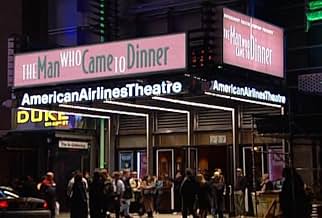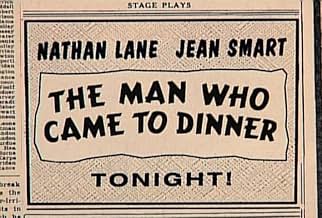Cantankerous theatre critic Sheridan Whiteside falls on an icy sidewalk, breaks his hip, and is temporarily stranded at the Ohio home of Richard Stanley and his family. While he's there, Whi... Read allCantankerous theatre critic Sheridan Whiteside falls on an icy sidewalk, breaks his hip, and is temporarily stranded at the Ohio home of Richard Stanley and his family. While he's there, Whiteside turns life upside-down for everyone.Cantankerous theatre critic Sheridan Whiteside falls on an icy sidewalk, breaks his hip, and is temporarily stranded at the Ohio home of Richard Stanley and his family. While he's there, Whiteside turns life upside-down for everyone.
- Directors
- Writers
- Stars
Harriet Sansom Harris
- Maggie Cutler
- (as Harriet Harris)
Jeff Hayenga
- John
- (as Jeffrey Hayenga)
- Directors
- Writers
- All cast & crew
- Production, box office & more at IMDbPro
Featured reviews
We were unable to get tickets for this show while in NYC on vacation this summer, so it was a pure delight to have live Broadway brought into our home! We can only hope for more productions of a similar nature!!
As someone who goes out of his way to see performances of "The Man Who Came to Dinner"--one of the greatest comic concoctions of the 20th century--I thought this was the best media presentation of the play to date, much better than the 1940 film version. My only quibble concerns the decision to pattern Lewis Stadlen's Banjo after Jimmy Durante's version in the film, rather than Harpo Marx (upon whom the character was originally modelled), but that's a matter of personal taste. (And to be fair, Stadlen does just fine, perhaps even out-Duranting Durante.) Conversely, I can't imagine anyone better in the title role than Nathan Lane, and he lives up to my hopes splendidly. (I hope PBS broadcasts him in "The Producers" one of these days!)
I enjoyed the taped stage play setting and all of the characters were immediately familiar to me, having just viewed the 1942 version. I rarely miss anything that Nathan Lane does and thought him perfect casting as Sheridan Whiteside.
However...it all seemed a bit forced to me. Lane's delivery was good and his mugging very funny, but he was working all the time. It just didn't seem to come naturally. The "Banjo" character was just an impersonation of Durante and an average one at that. As with the '42 film, I feel this character was superfluous.
The overall impression for me was one of a very good amateur company doing their very best to put on a show. I never forgot it was a play, whereas in the '42 version, I got more involved in the story.
As for the inter-act comments from the host and hostess, I skipped those immediately (so grateful for DVD technology!). The newsreel footage and swing music were delightful between the acts, though.
However...it all seemed a bit forced to me. Lane's delivery was good and his mugging very funny, but he was working all the time. It just didn't seem to come naturally. The "Banjo" character was just an impersonation of Durante and an average one at that. As with the '42 film, I feel this character was superfluous.
The overall impression for me was one of a very good amateur company doing their very best to put on a show. I never forgot it was a play, whereas in the '42 version, I got more involved in the story.
As for the inter-act comments from the host and hostess, I skipped those immediately (so grateful for DVD technology!). The newsreel footage and swing music were delightful between the acts, though.
If you're in a mood to laugh yourself silly, this is the play for you. Nathan Lane is at his scenery-chewing best as Sheridan Whiteside (modeled on Alexander Woolcott), a critic, commentator, and friend of the great and near-great who is forced to spend several weeks in the home of a Middle America family for whom "Goodbye Mister Chips" is as high on the cultural scale as they go. Lewis Stadlen is equally hilarious as the manic, irrepressible Banjo (a takeoff of one of the Marx Brothers, but I'm not sure which). Jean Smart is wonderful as the haughty and man-eating Lorraine Sheldon, and Harriet Harris is superb as Maggie Cutler, Whiteside's devoted secretary and Lorraine's nemesis.
To get all the references, you'll need a copy of Who Was Who in Theater, Film, and Opera, but I'm glad they didn't try to update them. It just wouldn't have worked.
Finally, kudos to Ryan Shively (as Sandy, union organizer and June's fiancee)! A talented actor and an all-around great guy (okay, he's my roommate, so I'm a little biased)!
To get all the references, you'll need a copy of Who Was Who in Theater, Film, and Opera, but I'm glad they didn't try to update them. It just wouldn't have worked.
Finally, kudos to Ryan Shively (as Sandy, union organizer and June's fiancee)! A talented actor and an all-around great guy (okay, he's my roommate, so I'm a little biased)!
PBS is to be commended for its "Stage on Screen" series premiere with this live broadcast from the newly restored 42nd Street theater district in New York City. While Nathan Lane has less of the imperious acidic bite that Monty Woolley brought to the 1942 film, Lane and the play still have punch and sparkle.
Of necessity, the live stage performance lacks the brisk pace of the movie simply because of the stops for scene changes or intermissions between acts. In addition, the classic film was pared down for length. In this broadcast, the interruptions were at least filled with chatty information about the play, the people represented in the play, and the resurrection of 42nd Street.
Despite or because of its dated allusions and overt references, the play is a delightful slice of real life in America just prior to World War II. The work stands up well and is likely to be a classic of 20th Century American theater.
Of necessity, the live stage performance lacks the brisk pace of the movie simply because of the stops for scene changes or intermissions between acts. In addition, the classic film was pared down for length. In this broadcast, the interruptions were at least filled with chatty information about the play, the people represented in the play, and the resurrection of 42nd Street.
Despite or because of its dated allusions and overt references, the play is a delightful slice of real life in America just prior to World War II. The work stands up well and is likely to be a classic of 20th Century American theater.
Did you know
- TriviaThe part of Banjo was originally based on Alexander Woollcott's good friend, Harpo Marx. However, in this production, the character is blatantly patterned after Jimmy Durante, who played the role in the 1942 film adaptation.
- Quotes
Sheridan Whiteside: I may vomit.
- ConnectionsReferenced in My Boys: Free Agent (2006)
Details
Contribute to this page
Suggest an edit or add missing content































